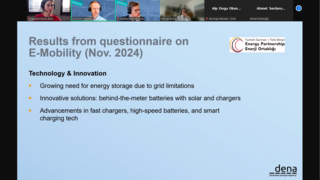Online Workshop on the Expansion of Charging Infrastructure for Electric Vehicles in Türkiye

On 7th January 2025, representatives and experts from Türkiye and Germany convened online for a workshop and panel discussion focused on the current status, barriers, and drivers for the expansion of charging infrastructure for electric vehicles (EVs) in Türkiye. This event was organised within the framework of the Working Group on Renewable Energies, Energy Infrastructure, and Sector Coupling of the Turkish-German Energy Partnership.
Key participants included representatives from Enerjisa Enerji, Vestel Mobility, Shura Energy Transition Center, Borusan EnBW Enerji, EPRA Energy, and other organisations, along with officials from various public and private institutions.
The opening remarks by Hannes Salomon from dena emphasised the critical role of e-mobility in achieving climate-friendly mobility. With over 120,000 EVs in Türkiye and rapid growth projected, the country is advancing steadily toward a greener future. While Türkiye’s efforts were positively highlighted, challenges such as limited grid capacity, insufficient charging coverage in rural areas, and the need for faster permitting processes remain key areas for improvement.
The event included a presentation of findings from a 2024 questionnaire on Türkiye’s EV charging infrastructure, delivered by Christian Kürschner from dena. The results showed significant progress, including an increase in the number of charging points to over 22,000 by August 2024, with more than 8,000 direct current (DC) stations now available, primarily in urban areas. Participants discussed opportunities to implement innovative solutions such as energy storage systems and smart charging to address grid challenges and expand coverage.
The panel discussion, featuring insights from industry leaders such as Hasan Aksoy (Shura Energy Transition Center), Gülay Avcuoğlu (Enerjisa Enerji), and Yusuf Enes Akdoğar (Vestel Mobility). Despite challenges, including grid capacity limitations and the need for better rural coverage, practical solutions like energy storage systems, dynamic pricing, and faster permitting processes were discussed as drivers to overcoming these barriers. Further key themes included the importance of coordinated planning among stakeholders and the benefits of stronger collaboration with municipalities to identify suitable locations for new charging stations.
The wrap-up emphasised that Türkiye’s current and planned expansion of charging infrastructure has been positively received by participants. The country is pursuing many successful approaches, such as regulatory frameworks. Although challenges persist, participants agreed that there are practical solutions to overcome them and maintain the momentum of progress.
The results of the questionnaire will be compiled into a policy paper in spring 2025, offering further insights and recommendations. A follow-up workshop focusing on e-mobility and charging infrastructure is planned for later this year, continuing the commitment of Türkiye and Germany to shaping a sustainable energy future.